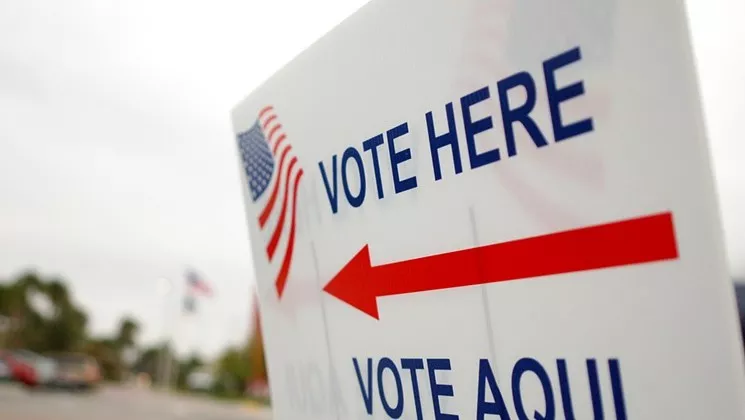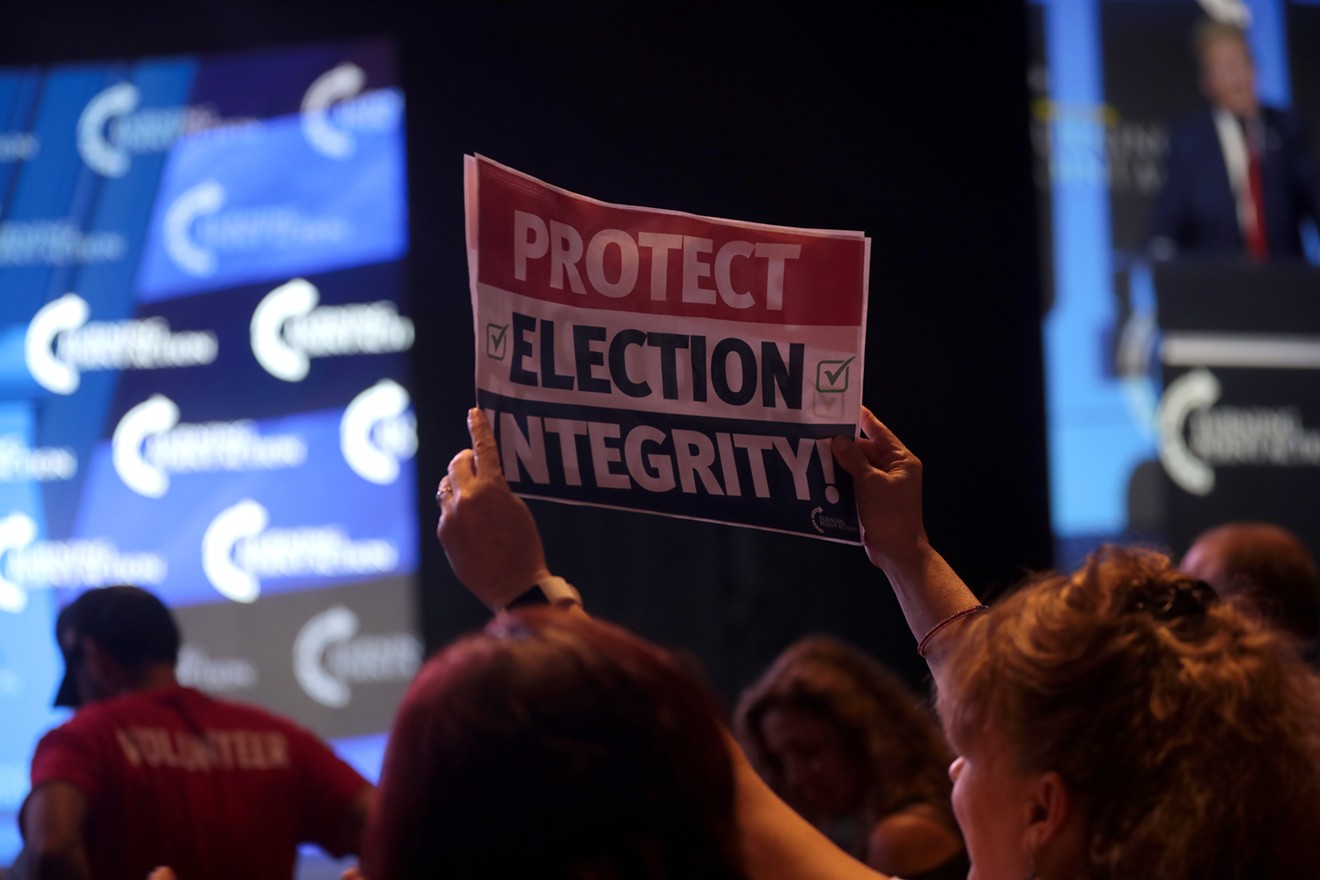“We’ve got to get our elections reformed so that every Arizonan, when they go to bed on election night, they know the winner and they’re satisfied that it was a fair election,” Kari Lake, the Republican nominee for governor, said in the days following the August primary. “We don’t have that right now.”
The thing is, we never did.
Legally, election officials are given 20 days to finalize and certify results.
In fact, tallying votes this year is actually going faster than usual, a top Maricopa County elections official told Phoenix New Times.

Maricopa County Recorder Stephen Richer made this promise to voters in Arizona and their ballots: “We will tabulate them as quickly as we can.”
Katya Schwenk
Is Vote Counting Any Slower Than Usual?
Simply put — no.“The August primary was faster,” Maricopa County Recorder Stephen Richer, a Republican, told New Times.
Election officials collected all of the state’s early ballots the weekend before Election Day. They uploaded the results from in-person voting by 12:30 a.m. on Election Night — the second-fastest tally in the last 30 years.
They were also faster to eclipse 98 percent of results, doing so in just 72 hours. That’s the quickest since Arizona’s ballot curing law was enacted in 2018. The law offers voters the opportunity to “cure,” or fix, ballots so they can still be counted when a signature is missing or mismatched.
Why Isn’t it Possible to Count All the Votes on Election Night?
Two reasons. First, Arizona state law allows voters up to five business days to “cure” a signature.
“For any signatures that we’ve marked nonmatching at both first level and manager level, we contact the voter, and the voter can get back to us in five business days and say, ‘Yes, this was me,’” Richer said.
Secondly, there are “late earlies,” or early voting ballots dropped off on Election Day. For the August primary, approximately 122,000 early ballots were dropped off on the day of the election. For the general election in November 2020, that number was just shy of 200,000.
“By law, we cannot retrieve those early ballots until after polls have closed and all voters have left,” Richer said. That’s usually around 8 p.m. “We then have to undergo all the normal early ballot processes that ensure the identity of the voter and the validity of the vote.”
Election officials bring those ballots to the county’s central facility. They are barcode-scanned to make sure each voter is up to date on their registration and hasn’t already cast a ballot. Then, an image of the signature is captured. That image is compared by a human reviewer with historic signatures on file for the voter.
It’s a tedious process.
If it’s deemed a good signature, then the signature goes to an audit queue. After completing these two steps, the ballot envelope is sliced open and extracted by a bipartisan team. That team makes sure there is only one ballot in the envelope, that the ballot style is correct, and that the ballot isn’t damaged or otherwise unreadable by the tabulator.
“Only then can it be sent to the tabulation room,” Richer said.
For the August primary, the Recorder’s Office had 70 percent of the eventual returns in its first report at 8 p.m. By the end of the night, it had added all of the ballots cast in person on Election Day and had 83 percent of the total returns available.
That’s “faster than ordinary for the county,” Richer said.

Despite unfounded complaints alleging otherwise, this year’s vote counting is actually going faster than usual, a top Maricopa County elections official said.
Erik (Hash) Hersman/Flickr
Have Official Election Results Ever Been Announced on Election Night in Arizona?
Never, Richer said.Historically, races have been called by media outlets on Election Night. Media outlets make projections based on available returns.
For example, in the August primary, with 70 percent of the returns immediately available at 8 p.m. on Election Night, media outlets were quick to call Secretary of State Katie Hobbs the winner of the Democratic gubernatorial primary. "They extrapolated from the wide margin separating the candidates in the first results that it was a very high probability that Hobbs would be the eventual winner,” Richer said.
But those results still weren’t official. Nobody called Lake the winner of the Republican primary on Election Night (except Lake herself) since her race with former Arizona Board of Regents member Karrin Taylor Robson was so close.
“We’ve never had all the ballots counted on Election Night,” Richer said. “And no state has all votes counted on Election Night.”
The results aren't official until the election canvass is presented to the Board of Supervisors in each of Arizona’s 15 counties.
Does a Delay in Counting Votes Mean Someone's Cheating?
Again, the answer is no.“Quite the opposite,” Richer said. “It means we’re doing our job and verifying the identity, security, and accuracy of every vote.”
Around the world, especially in wealthy democracies, races sometimes take time to call.
In Sweden, the results of the September 2018 general elections weren't announced for several days. After the results were finally in, the country remained in a political impasse as legislative parties jockeyed for seats with no apparent winner.
Israel, meanwhile, has been caught in the same election cycle since 2019.
But in some countries, including Brazil and France, the government releases a tally on Election Night. That’s not possible in the U.S., experts have said, because of the country’s highly decentralized elections.
“We always tabulate as fast as we can without compromising the accuracy, security, and transparency of the process.” — Maricopa County Recorder Stephen Richer
tweet this
What If We Hand-Counted Paper Ballots?
“France, same day all paper, had VERIFIED numbers in evening,” former President Donald Trump wrote on his website just after the Arizona primary in August. “U.S. is a laughing stock on Elections.”In February, Republican Arizona state Senator Wendy Rogers introduced Senate Bill 1338, which would require all ballots in Arizona to be paper and hand-counted. She touted it as the most secure way to conduct elections, citing French policy.
What Trump and Rogers failed to mention is that there was only one race on the ballot during the French election in April. Elections for federal and statewide offices, the state legislature, judges, school boards, and 10 ballot measures are all on a single ballot in Arizona.
Hand-counting is, by far, one of the slowest methods of tabulating votes and often adds human error to the process. Voting machine conspiracy theories in one Nevada county recently led to an unprecedented and behindhand count of mail-in ballots. It took 10 people three hours to count 50 ballots, according to the Associated Press.
As volunteers in Nye County, Nevada, began the hand count, officials in one of Arizona’s most Republican counties took notice. The Cochise County Board of Supervisors voted last month to hand-count every single ballot cast in the election, citing similar conspiracy theories about the reliability of electronic voting machines. That was all in spite of repeated warnings from the Cochise County attorney, Hobbs, and the state Legislative Council that the action could be illegal.
There is no evidence of tampering with voting machines.
Vote of (No) Confidence
On August 4, the Maricopa County Republican Committee censured Richer, and alleged “significant failures” in his administration of the primary election two days before, specifically relating to “late counting and delayed results.”Maricopa County Recorder Stephen Richer responded to being censured by the Maricopa GOP with this 17-page letter debunking each of the committee’s ludicrous claims.
Stephen Richer
“We are getting through early ballots as they come in now,” Richer said. “We always tabulate as fast as we can without compromising the accuracy, security, and transparency of the process.”
Richer’s censure is one of countless examples of Republican operators bogging down a simple process that has worked for decades in America. Last week, Arizona’s GOP nominee for secretary of state, Mark Finchem, floated a new conspiracy theory of his own to sow doubt in his supporters over the issue. He claimed that “far-left radicals who run Twitter are trying to assure us elections are safe and secure while delaying the results.”
It's part of a concerted effort by Republicans to preemptively claim shenanigans in case they lose their races, Arizona Democratic Party spokesperson Hannah Goss said.
“Despite election conspiracies and preemptive claims of cheating from Republicans up and down the ballot including [Blake] Masters, Lake, and Finchem, Arizonans are already utilizing our secure and trusted early voting system,” Goss said. “Historically, 90 percent of Arizonans — Democrats, Independents, and Republicans alike — have voted before Election Day in Arizona.”
And this year isn’t looking any different, according to election officials.
Whether you vote by mail or in person, on Election Day or weeks before, Richer made this promise to voters in Arizona and their ballots: “We will tabulate them as quickly as we can.”











